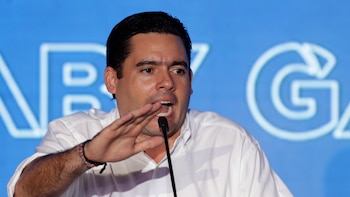
(ATR) Heike Größwang tells Around the Rings she will "try to be a woman and do the job" as she succeeds Ermanno Gardella, secretary general of the International Bobsleigh & Skeleton Federation since 1970.
Größwang was appointed to the role earlier this month at the FIBT Congress in Sochi, where she also toured the Olympic track being built for 2014.
Read on for her take on "Sanki" Sliding Center, Sochi's organizing committee and the challenges ahead for her sport.
Around the Rings: Are you nervous to be succeeding a man who was secretary general for 42 years?
Heike Größwang: I’m not nervous, actually, because first of all we had an agreement that the secretary general Ermanno Gardella had a transition time of two years, so we were working together closely for the past two years. I was the executive director, so I was able to work together with him and understand all the procedures and everything.
For sure, if you follow somebody who has been doing this job for 42 years, you will never ever be able to gain the experience that he has and all the wisdom and the knowledge and everything, so I’m not nervous but I appreciate everything that he knows and I’m in the lucky position that he remains as our consultant, so whenever I feel I have a question, I am able to ask him.
ATR: How does the secretary general role differ from your previous position as executive director?
HG: First of all, the secretary general together with the president and the vice president of finance in our federation are what is called the executive management, so those three are taking the main decisions of the federation after having spoken with the vice president and everything.
I would say that the secretary general more has a leading role in where the federation has to go in accordance with the president, whereas the executive director is more for organizational things. The secretary general has still a lot of organization, but also ensures the direction the president gives is also put in place.
ATR: You join only a handful of women currently serving as either the president or secretary general of an international federation for an Olympic sport. How proud of that are you personally, and what does this mean for the FIBT?
HG: Honestly speaking, I don’t see any difference if it’s a man or a woman. I know that there are only a few, so for me that doesn’t make any difference if it’s a man or a woman. It’s the quality that you give to your position, whatever the position is, and I think that the most important thing is you don’t behave like a man when you’re in the position. Try to be a woman and do the job.
ATR: Are you and your FIBT colleagues happy with the progress you’re seeing at the sliding center in Sochi and also from the organizing committee in general?
HG: I have to say, I was there two years ago, and what the progress was in the last two years was amazing. We had a chance to get a tour of the track [during the congress], so everything is very well done and it’s in a timeframe that is acceptable.
Also, from an organizational standpoint, whenever you have a request from an international federation, they try to put it in place, so I would say we are very happy with the proceedings and also with the organization.
ATR: Has bobsleigh or skeleton had any test events at the Sochi sliding center yet?
HG: We had some test runs in March, but we will have our official test event in February 2013.
ATR: What other major items came out of the congress besides your appointment?
HG: Well, we awarded the 2016 world championships to Igls, Austria, and we have made some changes to the rules, which are not very significant – it’s just more or less working out the wording of the rules so they are more precise – but I would say giving the world championships to Igls was one of the most important things.
ATR: What role will the new branch office in Austria play in the administration of FIBT?
Her: It will be more an organizational part that we have established from a geographic point of view. It is very central in Europe, so we wanted to be able to communicate more personally with our coaches and with our staff, and it’s always Salzburg. It’s always on the way from one track to another, so our national federations and our coaches and even the athletes can come by the office and talk. We want to communicate better with them.
ATR: And you’re in the Salzburg office, correct?
HG: Yes.
ATR: Is the secretary general position a four-year term, or how does that work?
HG: It’s a non-restricted term, so as long as the reigning president is happy with me, I can be in this position. So if someone is not happy with me anymore, I’m out.
ATR: What do you hope to accomplish or change now that you are FIBT secretary general?
HG: Well, the former secretary general has done great and incredible work. I think that nobody as a single person can do what he has done in the past, but what we have to establish now is putting in place a better communication system with our national federations – you know, using all those means of communication and improving it. This will be the first step that we have to go forward, also improving the communication with the media and press and so on.
ATR: What’s next for FIBT? Just looking ahead to next season and to Sochi?
HG: I think for the next season, it’s the world championships in St. Moritz, and 2013 also means the 90th year of our federation, so we have an anniversary going on. And for sure, the test event at the end of the season going on in Sochi will be one of the big things in the next season.
Interview conducted by Matthew Grayson
20 Years at #1:
Últimas Noticias
Boxing’s place in the Olympics remains in peril as IOC still unhappy with the state of AIBA’s reform efforts
The IOC says issues concerning governance, finance, and refereeing and judging must be sorted out to its satisfaction. AIBA says it’s confident that will happen and the federation will be reinstated.

McLaren report to FIBA confirms abuses in the Mali women’s basketball program
The investigation could not “independently verify” allegations against FIBA president Hamane Niang, who has resumed his duties after stepping aside during the probe.

ATR Extra: 1st ISF U15 World School Sport Games – Belgrade 2021
Olympic Channel is live streaming the basketball, basketball 3x3, football, judo and wrestling competitions during the event, which runs September 11-19.

International Judo Federation bans Algerian athlete and coach for 10 years for refusing to fight an Israeli at Tokyo 2020
Judoka Fethi Nourine and his coach Amar Benikhlef admitted they were withdrawing from competition to avoid a potential match with Tohar Butbul of Israel.

IIHF bans Belarus hockey president for five years for code of conduct violations - Federation Focus
Also: no contested election for next ITTF president; BWF calendar shrinks as event in India cancelled due to pandemic; FISU announces early bids for 2027 and 2029 World University Games




